Asthma and Exercise
Most people with Asthma can exercise and become fit. But the type, and intensity of exercise Asthmatics can do varies greatly from person to person. Here’s a video that outlines the rules of thumb.
Lost your password? Please enter your email address. You will receive a link to create a new password.
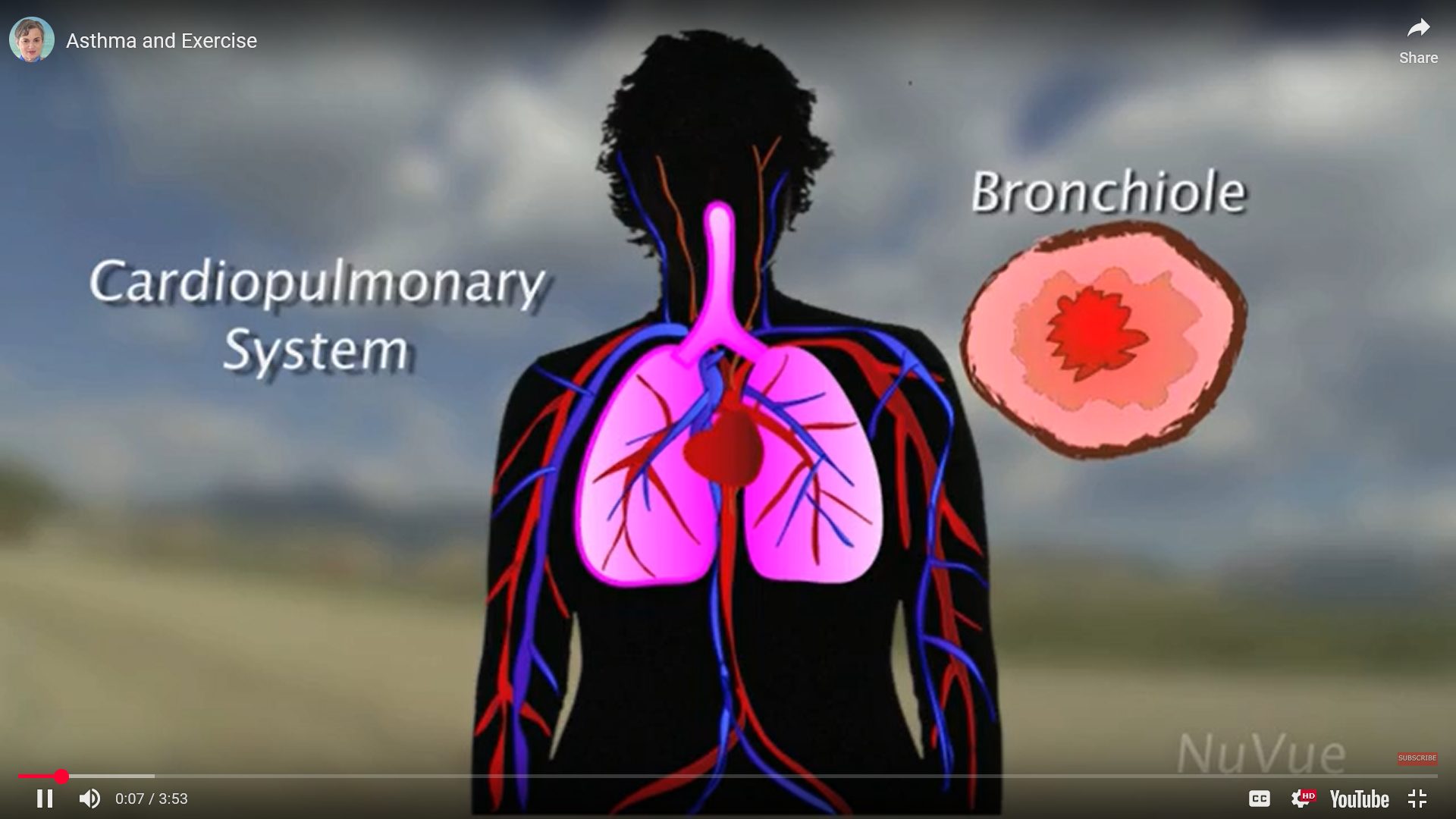
Most people with Asthma can exercise and become fit. But the type, and intensity of exercise Asthmatics can do varies greatly from person to person. Here’s a video that outlines the rules of thumb.
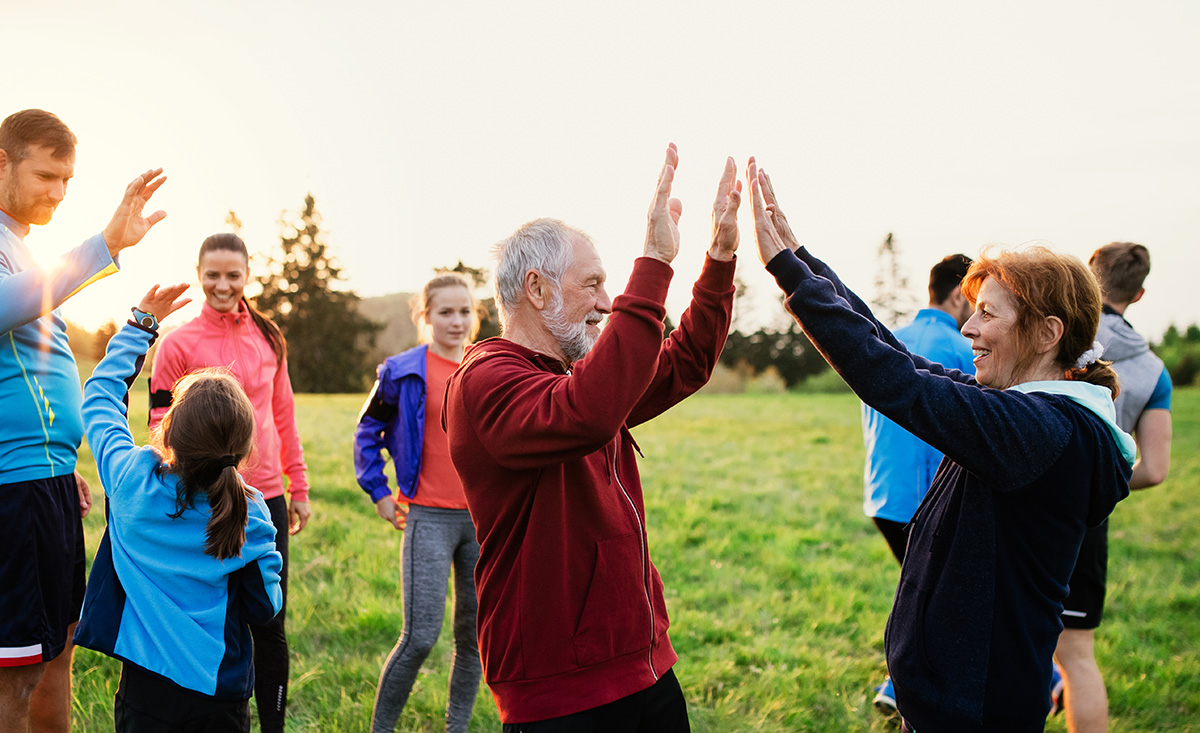
Exercise outdoors when it’s hot can be a challenge. Cross training exercises are a good way to mix up your workouts and give yourself time to cool off, drink water and stay hydrated in summer heat.
Although I’m away from home, in the mountains, and not as affected by this huge triple digit heat wave, I did get a wake-up call of my own that I thought would be important to share. I was shooting an exercise video this week in 90-degree heat. It was hot, but I got on a roll and forgot about the time. Less than an hour in, I started to swoon. Not a good shot on an exercise video. I realized immediately what had happened; I’d gotten so involved, I forgot to drink water between takes. I can say from experience that it creeps up on you. So you need to take steps to keep yourself cool and well-hydrated when you exercise outdoors. Cross-train with strength exercises mixed in with your cardio gives you a lower intensity interval so you can drink water, stay hydrated and cool off.
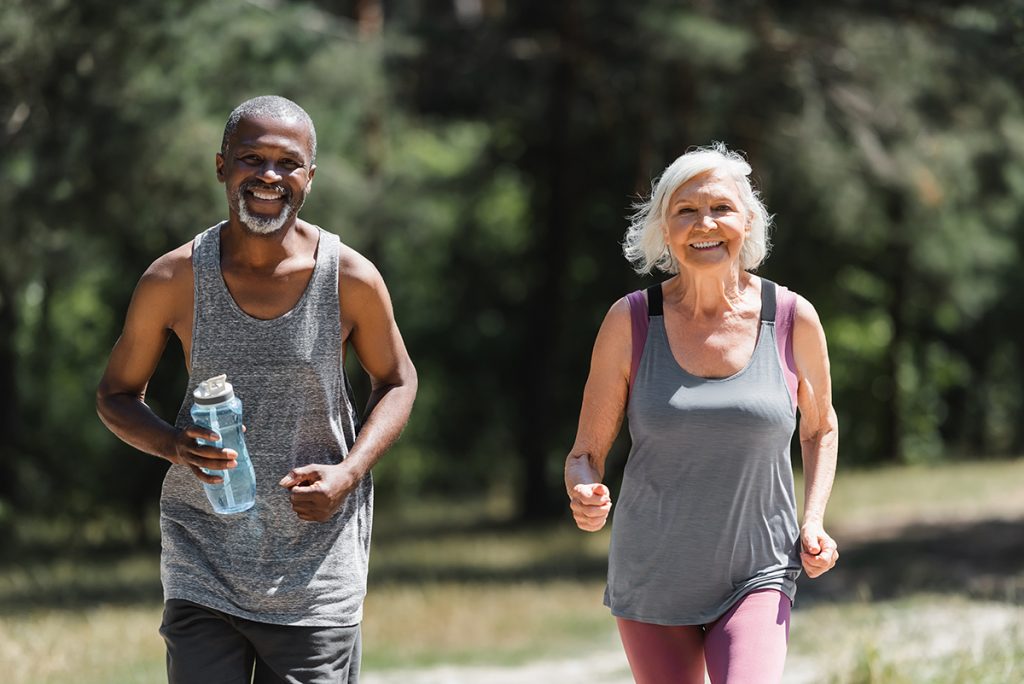
According to the American College of Sports Medicine losing more than 2 percent of your body weight through dehydration puts your body at risk for heat illness. This is serious business. We’ve all read the stories of team athletes who have actually died.
When you exercise in the heat you can lose up to five cups of water per hour. So it’s important to drink water before, during, and after vigorous exercise. The rule of thumb is to drink 2 cups of water a couple of hours before you start exercising so you are fully hydrated. Remember to bring that water bottle with you and drink a cup of water every 15 minutes or so while you are exercising. Don’t wait till you’re thirsty. If you’re thirsty, you’re already getting dehydrated.
But you’re not done yet. You need to drink another 2 cups over a two-hour period after exercise.
Sounds like a lot of water. It’s not. It’s just making up for the water you lose when you exercise in the heat.
Pouring water over your head during exercise won’t help you rehydrate, but it does make you feel better. A study at Cal State Fullerton with trained athletes showed that athletes exercising in 92-degree heat in a controlled setting felt cooler and that the workout was easier to perform.
But you know what Noel Coward said about “mad dogs and Englishmen.” Give yourself a break. If you can, exercise outdoors when it’s cooler, early mornings or late afternoons when the sun is less direct. Try finding shady areas.
Instead of keeping up your brisk pace for the whole workout, break it up. Go at normal pace for a bit, do a short light interval and then pick up your speed again.
Another idea is when you exercise outdoors do cross training exercises. Add intervals of strength training between shorter bouts of cardio. You’ll get a chance to drink and pour some water over your head too! Stop at a wall, a tree or a fence, and do these five exercises: two for your upper body and three for your lower.
Here is an Exercise Outdoors video with some easy cross training exercises to tone you up, no equipment necessary. (Please subscribe to my YOUTUBE channel; I have several more health & fitness videos!)
With all these Strength training exercises, remember to exhale on the exertion.
Standing Push Ups: Stand facing a surface with legs hip width apart and place hands shoulder width apart. Keeping your body straight, lower yourself down to the surface and then push back upright again. Muscles Worked: Chest, Triceps, and Shoulders
Calf Raises: Face surface and hold on for balance. With feet together pointing straight ahead, slowly lift your body up on to your toes, while tightening calf, abs and buttocks muscles. Then slowly lower yourself back down again.
Muscles worked: calves, abs, and buttocks.
Squats: Face surface, legs hip with apart. Hold on for balance. Shift weight back into heels. Keeping back straight, abs pulled in, gently bend at the knees and squat to about a 90-degree angle. Hold for a moment, then, using just your leg muscles, return to an upright position.
Muscles worked: Front of thigh (Quads), Back of thigh, (Hamstrings) Buttocks, Abs
Wall Sit: Stand against surface for back support. Holding on as needed for balance, slide down to a sitting position against wall, knees at about a 90-degree angle. Pull your abs in and hold for 10 to 30 seconds.
Muscles worked: Thighs and Abs
Upper Back Squeeze: Stand with your back to the surface, feet shoulder width apart. Place hands behind you on surface. Straighten your arms behind you and squeeze your shoulder blades together. Hold for 10 to 30 seconds.
Muscles worked: Back, Shoulders, Back of arms (Triceps)
Mirabai Holland MFA, EP-C, CHC is one of the foremost authorities in the health and wellness industry. Her customer top rated exercise videos are now available online 24/7 at on her website for Age-Onset health issues like Osteoporosis, Arthritis, Heart Disease, Diabetes, Orthopedic Issues & more. Mirabai also offers one-on-on Health Coaching as well as a NEW Weight Management 8 Week Course Lose To Win™ on ZOOM or Phone. For more info, visit mirabaiholland.com. Contact her at askmirabai@movingfree.com
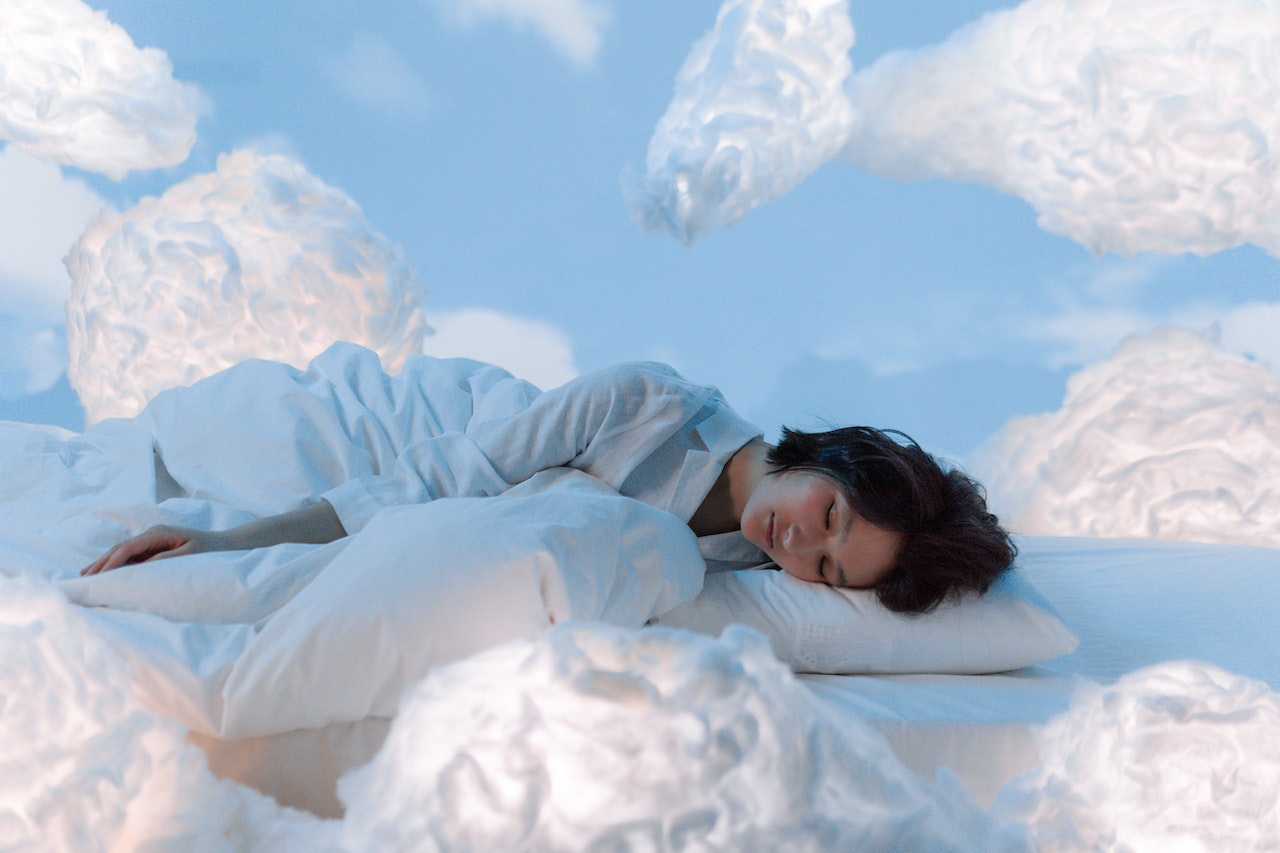
Eating fewer calories, exercising more and still having a hard time getting those extra pounds off? Here’s a question for you: How’s your sleep?
I for one, every time I travel, seem to gain a couple of pounds just when I want to look my best.
I noticed that I tend to sleep less and intermittently when I am on the road. Once I settle again in a place, my sleep gets more regulated and I am able to drop those pounds.
I’ve adjusted my sleep pattern, as I have gotten older to help myself sleep better. The earlier I get up in the morning the better chance I have of getting to sleep that night and staying asleep for a longer period of time. I’m more energized, and when I eat, I eat less and feel more filled.
It turns out that there are many studies that indicate that sleeping less then 7 hours can increase body weight. One recent study with several pairs of twins, found that the twin who slept more than 9 hours was about half as likely to gain weight as the one that slept only 7.
Sleep deprivation affects your hunger urge. If you sleep less, you feel like eating more and you probably do. That’s because not sleeping increases your body’s level of ghrelin, the hunger hormone and decreases leptin the “I’m full” hormone.
A sleep study in Finland with middle-aged adults who had sleep problems found that women had greater sleep related weight gains than men. Though men were also affected. The study indicated that it seems the fewer hours you sleep the more calories you tend to eat the next day.
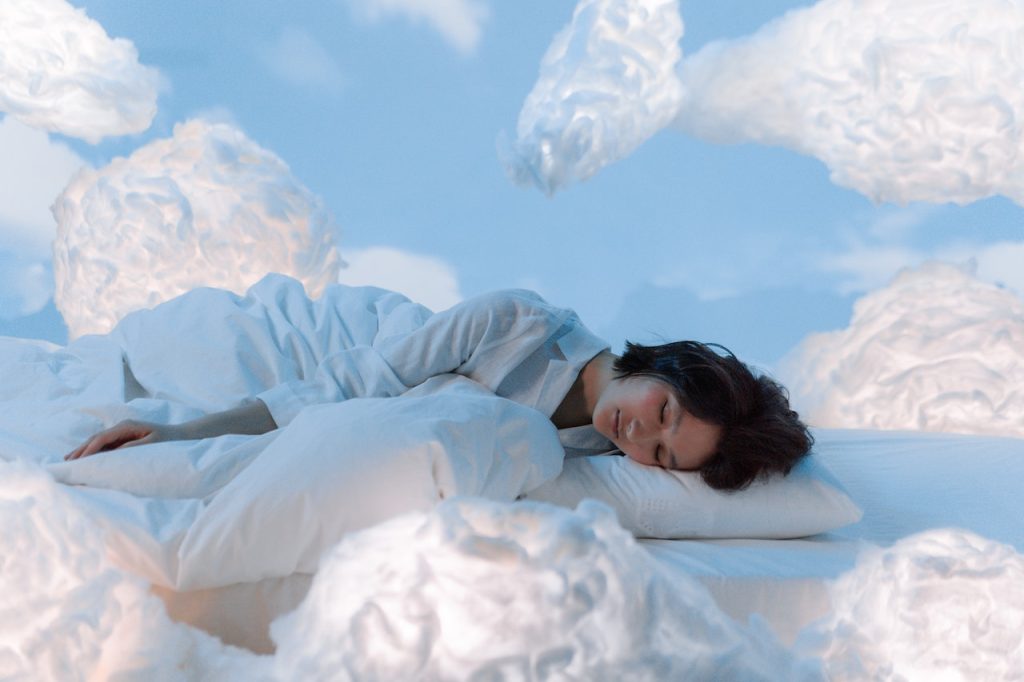
If you want a good night sleep here’s are some things to consider:
Exercise: Don’t exercise too late in the day. So many of us go to the gym after work but it can keep you up at night. Late exercise can prevent the body from making sleep-inducing melatonin for several hours.
Caffeine: It can take 6 or more hours to wear off. Having that cup of coffee after dinner, even with a low-fat dessert, may not be such a good idea.
Alcohol: A couple of drinks with dinner can wake you up in the middle of the night and make it hard to get back to sleep. I have a friend who swears by a glass or two of wine at lunch but never alcohol after 2pm. She says she sleeps like a baby at night. I think if I had a glass or two at lunch, I’d sleep like a baby at 2pm and be up for the night at 5.
Stress: And then there is our old buddy stress. We all have some level of stress and how we deal with it can keep us up at night. Getting yourself relaxed in quiet, dark, temperature controlled environment can relieve stress and induce a desire and ability to sleep.
So, what’s it going to be, wide awake at 3am or getting that beauty sleep and waking up lighter and brighter on your toes? Learning to get a good night’s sleep is a process. Don’t stress over it, it may keep you up at night.
Mirabai Holland MFA, EP-C, CHC is one of the foremost authorities is the health and fitness industry. Her customer top rated exercise videos for Age-Onset health issues like Osteoporosis, Arthritis, Heart Disease, Diabetes & more are available at www.mirabaiholland.com. Mirabai also offers one-on-on Health Coaching on Skype or Phone. Contact her at askmirabai@movingfree.com.
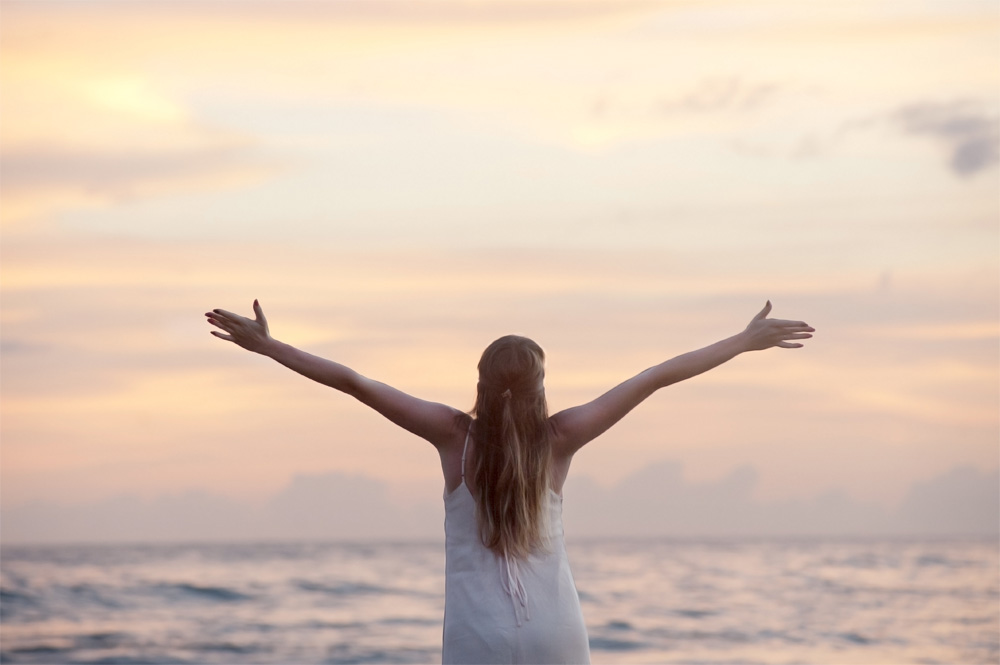
How do we want to feel throughout our lifetime? Health and mobility are at the top of my list. For me it boils down to taking care of myself.
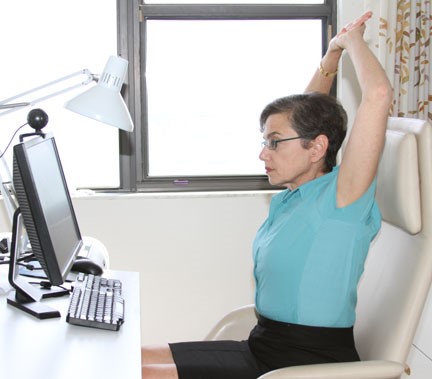
So you go to your annual check-up and your doc says “whoops your blood pressure is up and you’re 15 pounds heavier than last year. I’ll give you some meds, but you’ll have to lose weight and get into shape, OK?
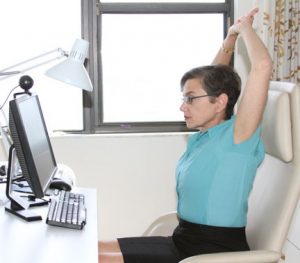 You say OK, you walk out and then what?
You say OK, you walk out and then what?
Join a gym, hire a personal trainer, go on a diet, take a walk? You might do one or several of these because, after all, it’s a new year and a new you.
Right? Right, and you try something. But how long is it till you throw up your hands and say, “ugh, I got started and now I’m off the track just like last year.”
What went wrong? Maybe nothing, except you might not have been psychologically ready to take those steps.
For any change there is a process. One of the models that are used is the transtheoretical model of behavior change (TTM) developed by James O. Prochaska , Ph.D
Precontemplation – going along not aware of a need for, or not wanting a change.
Contemplation – recognizing a need to do something to improve your situation and considering making some sort of change.
Preparation – doing some research, making small changes, or at least thinking about what you’re going to do to help yourself.
Action – Actively making lifestyle changes,
Maintenance – Having made changes, keeping the healthy lifestyle going.
All too often we jump from contemplation to action without being ready for the change. It can feel like getting off a plane in Antarctica wearing shorts and a T-shirt. You wanted to be there but you weren’t ready for what that change would be like, and what you’d need to do to stay there comfortably.
But there is help, a new kind of help.
The health and fitness industry is rising to the challenge of our increased involvement with our own health care.
Many of us still think of fitness professionals as muscle heads with great bodies and not much else. Those types will always exist, but more educational opportunities including degrees and certifications are spawning a new breed of health & fitness professional, one that’s part of the health as well as the fitness industry.
Not to be confused with a personal trainer, the Health & Wellness Coach is a consultant who helps you go, through, preparation, to action and on to maintenance. The coach helps you determine your health and wellness goals and needs. Once you have a path to your goals the coach continues to work with you to help you find the behavior modifications, activities, facilities and allied health professionals (MDs, Ph.Ds, Nurse Practitioners RDs, PTs, Personal Trainers, Exercise Instructors, etc.) to support your healthy lifestyle. You can do this on your own, but having someone with health industry knowledge who has your back, who is nonjudgmental, who just wants to help you focus and succeed can make all the difference.
Mirabai Holland MFA, EP-C, CHC is one of the foremost authorities is the health and fitness industry. Her customer top rated exercise videos for Age-Onset health issues like Osteoporosis, Arthritis, Heart Disease, Diabetes & more are available at www.mirabaiholland.com. Mirabai also offers one-on-on Health Coaching on Skype or Phone. Contact her at askmirabai@movingfree.com.
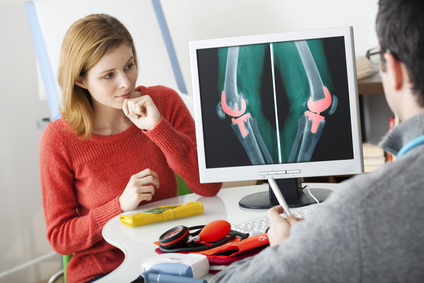
Orthopedic Injuries. Here’s one of mine. This picture is real. It was taken by my husband a few years ago. That’s me unable to lower my arm without passing out…
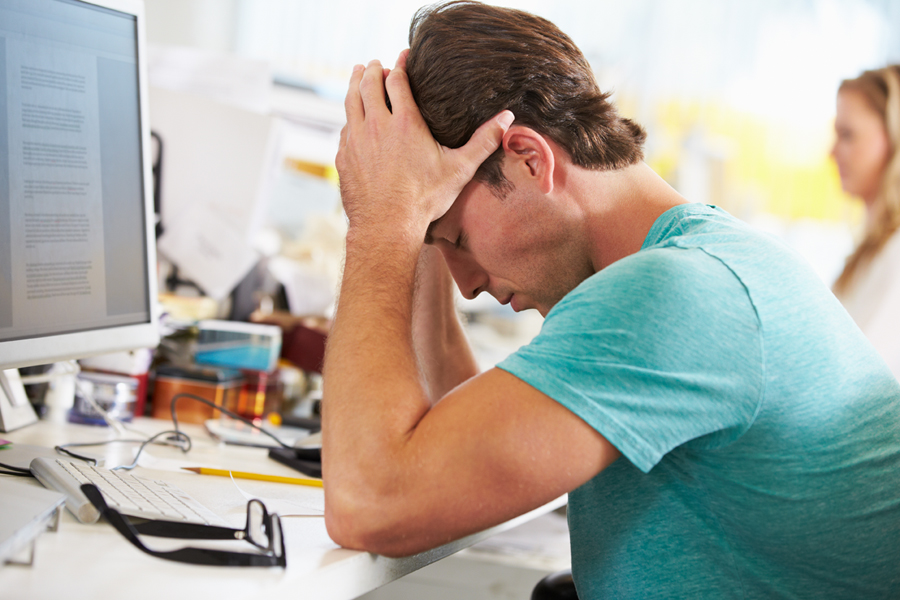
Stress. It’s everywhere. If you live and work on this planet it’s almost impossible to avoid. In normal times are stressful enough but this past year we have had to share our lives with Covid 19.
Feeling stressed? Me too!
Today I’m writing about how to reduce stress and suggest some easy ways to get that burden off your back.

Stress has been around since the beginning of time. It started as the fight-or-flight response when early humans confronted a life-threatening situation. In that situation, stress hormones- adrenaline and cortisol- are produced. Your blood vessels constrict, blood pressure goes up, pupils dilate, heart rate quickens, and breathing becomes more rapid. The body is preparing itself to do battle or run. This response is essential in times of acute danger. But problems at work, crying kids, traffic, you name it can trigger the same response.
Given the pressures of daily life, chronic stress itself has become a life-threatening situation. It can cause a host of health problems including headaches, gastrointestinal issues, insomnia, trouble concentrating, anxiety, depression, increased body weight, high blood pressure and heart disease.
We can’t eliminate the stress. But we can relieve the fight-or-flight response that sends our bodies into danger mode. And we can cultivate a relaxation response over time that will reduce our physiological stress reaction.
So what do we do about chronic stress? How do we get rid of it?
How? Relax. That’s what my first yoga teacher used to say when I was all bent up in the pretzel pose with a grimace on my face. Once I was able to relax, I was stress-free even in the pretzel pose.
Seriously, daily conscious relaxation exercises can make a real difference in the way your body responds to stress. Dr. Herbert Benson coined the phrase “relaxation response” in his book by the same name in 1975.
Since then, he and others have conducted numerous studies, including a recent one at the Benson-Henry Institute for Mind/Body Medicine, that have detailed the body’s intricate positive response to conscious relaxation exercises. In a nutshell, the relaxation response has the opposite effect of fight-or-flight. It engages the parasympathetic nervous system to counteract the effects of stress. You experience a feeling of deep relaxation and well-being. And if you practice relaxation regularly, you’ll feel better and help yourself avoid those stress-related health issues. That’s how we get rid of chronic stress.
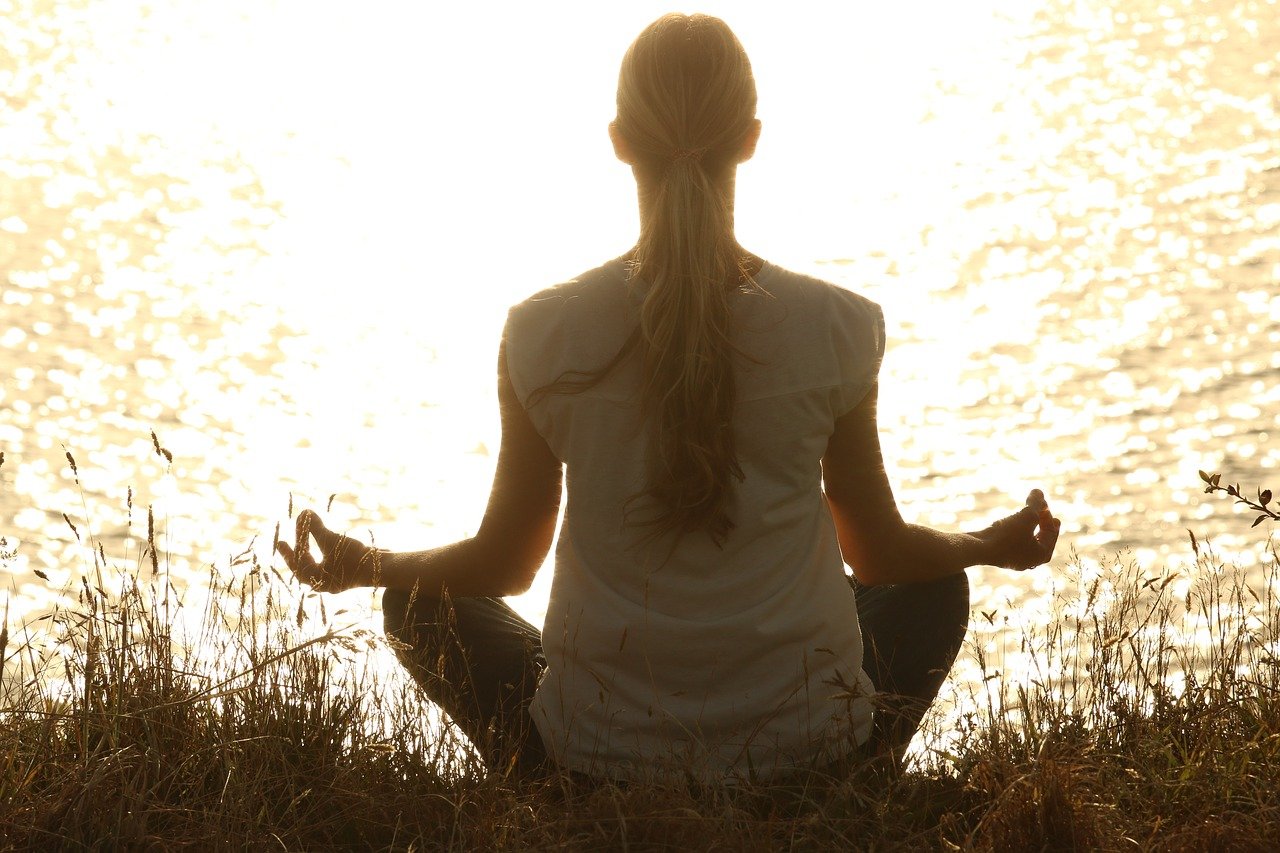
Meditation is just one of an almost infinite number of ways to consciously relax. Virtually anything that takes your attention away from your daily grind and makes you concentrate on just one thing can work. Doing the dishes, aerobic exercise, yoga, stretching, golf, playing a musical instrument, casting a fishing rod, playing with a cat — almost anything can work if you pay attention to only that and clear your mind. I’m partial to exercise because I get the benefits of a workout as well as the relaxation. It’s my mantra. It’s what I do to get rid of chronic stress.
Dr. Benson suggests you practice some form of conscious relaxation for 10 to 20 minutes every day to get rid of chronic stress in the long term.
But what if you’re pressed for time? (Pressed rhymes with stressed.)
Reduce Chronic Stress with this little exercise.
Sometimes you only need a few seconds and you feel a lot better.
That one worked too, didn’t it? I hope concentrating on reading this helped you reduce your stress and I hope you’ll make conscious relaxation a part of your life.
It’s a lifestyle change that’s easy to make because it feels so good when you do it.
Check out Mirabai’s video below, guiding you through a short Meditation and Stretch to reduce stress that can be done at work or home.
Mirabai Holland MFA, EP-C, CHC is one of the foremost authorities in the health and fitness industry. Her customer top-rated exercise videos for Health issues like Osteoporosis, Arthritis, Heart Disease, Diabetes & more are available on her website, mirabaiholland.com. Join her NEW Online Workout Club. Mirabai offers one-on-on Health Coaching on Skype or Phone. Contact her at askmirabai@movingfree.com

We all have a lot to lose if we take a serious fall. Assuming we survive, the effects can be life-altering. And if you have osteoporosis, what would have been a minor slip and fall for others, could have devastating consequences for you.
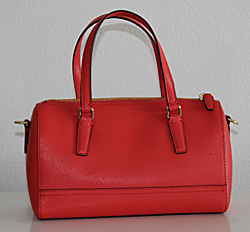 I have a friend who had been eyeballing this cute little red purse for a couple of months. She didn’t need it but she wanted it and sort of became obsessed with it.
I have a friend who had been eyeballing this cute little red purse for a couple of months. She didn’t need it but she wanted it and sort of became obsessed with it.
She’d visit it online and wave to it in the store. But, there’s no way she was going to buy that purse because wanting it that badly made her feel a little stupid.
Well, the darn thing went on sale the other day at 40-percent off and another 10-percent off with her store card. Now, of course, she had to have that red bag.
Apparently, so did every other woman in the United States. Because, she had it in her online shopping cart and by the time she got her credit card out, it was no longer available. It had been snatched right out of her cart.
She was furious. She felt violated. “How dare they sell MY red purse?”
She called the company. They apologized and looked for one in their inventory anywhere. They gave her stores and a warehouse to call and reserve it before the last one could be sold. She called around for over an hour and finally got to someone who found one in California and ordered it for her.
As she was patting herself on the back for her investigative skills and persistence my friend had an aha! moment. She had recently been diagnosed with osteoporosis. Her doctor had given her a list of endocrinologists he’d be comfortable recommending but she hadn’t even looked at it, let alone researched it.
“I had been meaning to but I had been putting it off for no good reason. I thought why on earth don’t I apply that same purse passion to taking charge of my own health care?”
She thought about it for a minute and the answer she came up with unnerved her a little. “Health care is not sexy,” Purses are sexy! Purses are sexier than being healthier and maybe living longer? Eek!
But health is sexy! Quality of life is sexy!
As she started to Google the doctors on the list, she began to sing a parody to that old rock song:
“I’m too sexy for my purse, too sexy for my mouse pad, but not too sexy for my doctor’s office. Maybe a little bit too sexy, but I’m goin’ anyway.”
I think perhaps my friend has touched a nerve in many of us. Would we really rather look good than feel good?
Sure seems like it. I think it’s that very premise that prompted an ad agency to come up with a TV commercial for a dietary supplement featuring a sexy dancing X-ray skeleton of a baby boomer model that’s protecting her looks by protecting her bones.
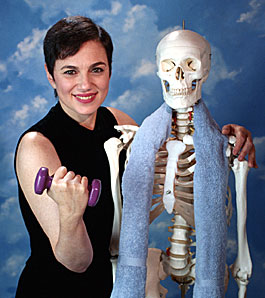
It got my attention. If you can’t get them to do it for health, get them to do it for beauty. Twistedly brilliant!
So I guess, if beauty is your motivation, go for it; especially when the health comes with it.
But what do you do if you already have osteoporosis like my friend, or have low bone mass, or you just have the good sense to want to take of your bones?
“Getting enough calcium in our diet is really important. The NOF recommends an intake of 1,000 milligrams for adult women from age 50 or younger, and age 51 and older — 1,200 milligrams a day for adult women. If a woman isn’t paying enough attention to calcium in her diet she puts herself at risk. But more is not necessarily better when it comes to calcium. Neither women nor men should get more than about 2,000 milligrams a day.”
Weight bearing exercise actually builds bone in youth and will help maintain bone. As we get older the type of exercise changes a little bit. We still have to do some impact work but it has to be safe to avoid injury and falls so you want to add balance training, flexibility training, and safe movement to make sure the individual is able to stay active and healthy.”
So what’s the takeaway here? My takeaway is if you like standing on your own two feet, taking care of your bones is about as sexy as it gets!
Originally printed on Moving Free with Mirabai. Reprinted with permission.
Mirabai Holland MFA, EP-C, CHC is one of the foremost authorities in the health and fitness industry. Her customer top rated exercise videos for Health issues like Osteoporosis, Arthritis, Heart Disease, Diabetes & more are available on her website, mirabaiholland.com. Join her NEW Online Workout Club. Mirabai offers one-on-on Health Coaching on Skype or Phone. Contact her at askmirabai@movingfree.com
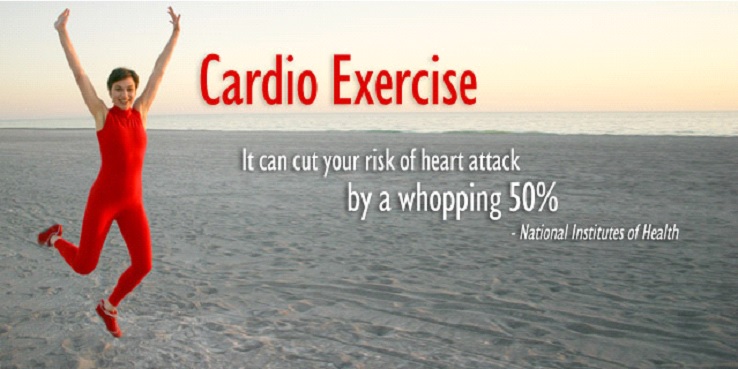
I became interested in cardio exercise routines and memory several years ago when my older students began to tell me that their memories seemed to improve after they took my class. I was teaching mostly cardio exercise routines in those days. I started with simple steps and built up to a pretty complex routine. There has to be a connection I thought, between the physical movement, making your brain learn this routine, and improved memory.